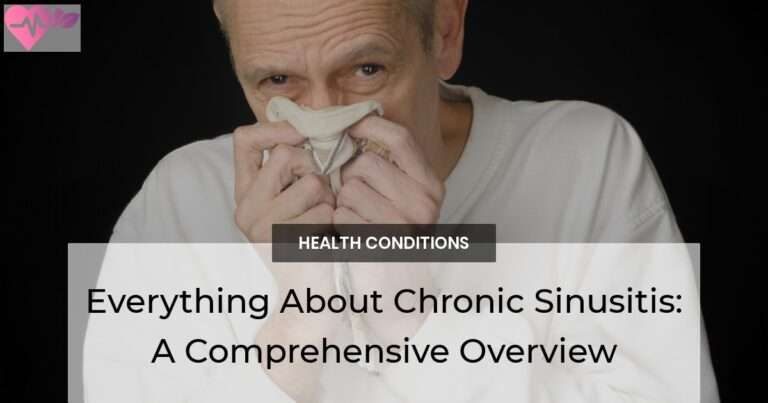Chronic sinusitis is a common medical condition that affects millions of people around the world. It is an inflammation of the sinuses that can last for months or even years. Symptoms of chronic sinusitis include facial pain, nasal congestion, headaches, and postnasal drip. In some cases, it can lead to more serious complications such as vision problems and infections in other parts of the body.
In this article, we will provide a comprehensive overview of chronic sinusitis including its causes, symptoms, diagnosis, and treatment options. We will also discuss potential risks associated with this condition and strategies to help manage it.
What is Chronic Sinusitis?
Chronic sinusitis is an inflammation of the paranasal sinuses which are air-filled cavities located behind your nose and cheeks. This inflammation can cause swelling in the nasal passages which leads to blockage or obstruction of normal airflow through these passages resulting in difficulty breathing through your nose as well as other symptoms such as facial pain or pressure, headache, fatigue, and postnasal drip (mucous dripping down the back of your throat).
In some cases, it can also lead to vision problems due to increased pressure on the eyes from blocked drainage pathways within the skull.
Causes Of Chronic Sinusitis
The most common cause of chronic sinusitis is a bacterial infection. However, there are many other potential causes that can contribute to this condition such as:
- Allergies (e.g., hay fever)
- Structural abnormalities (e.g., deviated septum)
- Environmental irritants (e.g., cigarette smoke)
- Fungal infections (e.g., Aspergillus).
In some cases, no identifiable cause may be found for chronic sinusitis and this is known as non-infectious rhinosinusitis.
Symptoms Of Chronic Sinusitis
The most common symptom associated with chronic sinusitis is facial pain or pressure. This can be felt across your forehead or around your eyes and cheeks.
Other symptoms of this condition include:
- Nasal congestion or blockage, leading to difficulty breathing through the nose;
- Thick yellowish-green mucous draining from the nose;
- Bad breath
- Headache
- Fatigue
- Loss of smell/taste
- Coughing/sneezing fits
- Fever/chills
- Dental pain
- Ear fullness/pressure/pain
- Itching around the eyes, nose, throat, etc.
Diagnosis Of Chronic Sinusitis
Chronic sinusitis is usually diagnosed by a combination of physical examination findings and imaging studies. Commonly used imaging tests for diagnosing chronic sinusitis include CT scans and MRIs. These tests are necessary to confirm the diagnosis and rule out any potential underlying conditions, such as tumors. Depending on individual circumstances, blood tests may also be conducted; however, these are not routinely required for diagnosis purposes.
Treatment Options For Chronic Sinusitis
The primary goal when treating chronic sinusitis is reducing inflammation to relieve symptoms and improve quality of life. This can be done by restoring normal airflow through affected areas, for which treatment options will vary depending on individual circumstances.
Typically, a combination therapy approach is used including:
- Antibiotics for bacterial infections if present
- Corticosteroids either orally via tablets or topically via sprays to reduce inflammation directly at the site
- Decongestants to reduce swelling in nasal passages
- Saline irrigation solutions to flush out excess mucous
- Mucolytics medications that help thin mucous making it easier for drainage
- Immunotherapy injections if allergies are suspected
- Surgery in severe cases where structural abnormalities need correcting etc.
Potential Risks Associated With Chronic Sinusitis
Although uncommon, there may be possible risks associated with the continued use of certain drugs used to treat chronic conditions.
These include:
- Gastrointestinal distress caused by oral steroids;
- An increased risk of eye damage from topical steroids;
- A heightened chance of developing secondary infections due to prolonged antibiotic use; and
- Decreased bone density stemming from long-term steroid inhaler usage.
Strategies To Help Manage Chronic Sintuis Effectively And Safely
Although managing chronic sinusitis can be challenging, the following strategies may help reduce the risk of potential complications while still providing relief from symptoms:
1) Adopt healthy lifestyle habits – maintain a healthy diet rich in fruits and vegetables, get regular exercise, and avoid smoking and alcohol consumption as well as excess caffeine intake.
2) Follow doctor’s instructions – take medications prescribed by your doctor exactly as directed even after feeling better.
3) Use saline irrigation solutions – using saline irrigation solutions regularly will help flush out excess mucous and keep airways clear.
4) Avoid allergens – identify triggers for allergies and reduce exposure to them wherever possible.
5) Try natural remedies – certain natural remedies like steam inhalation or eucalypt oil vapors have been found helpful in managing sinusitis.
6) Consider alternative treatments – acupuncture, yoga, and meditation have been found helpful in managing stress and anxiety related to sinusitis.
7) Seek medical advice promptly – seek medical advice promptly if there are any signs of worsening sinusitis such as high fever, persistent severe headaches, blurred vision or if you develop any new symptoms.
8) Consider an Elimination Diet – consider an elimination diet to reduce inflammation as well.
In conclusion, Chronic sinusitis is a condition that affects millions of people around the world and can cause a wide range of symptoms. It is important to seek medical attention if you are experiencing any of the symptoms of chronic sinusitis, as early diagnosis and treatment can help reduce the severity and duration of the condition. Understanding the underlying causes and triggers of chronic sinusitis can help you manage the condition and reduce your risk of developing complications. By following the advice of your healthcare provider, you can take steps to improve your quality of life and reduce your risk of experiencing chronic sinusitis in the future.

